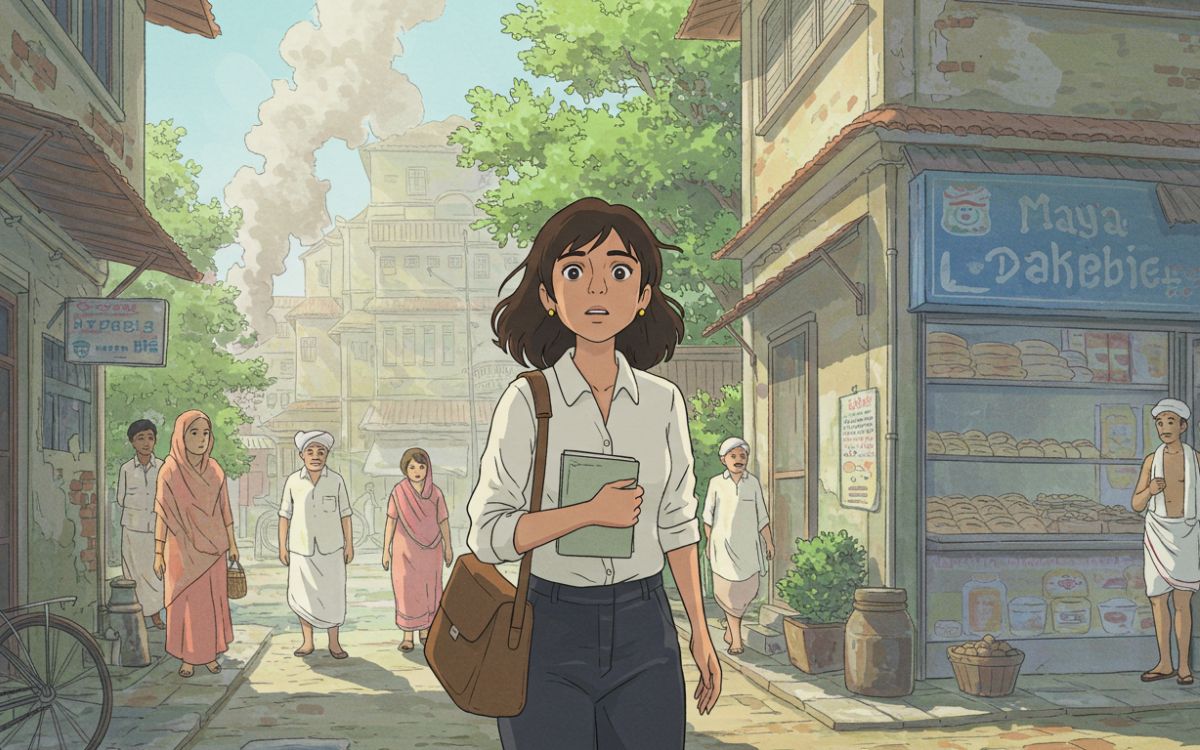She Closed Her Eyes for One Second- Maya never liked mornings. Every day felt the same—alarm blaring, cold tiles under her feet, and her boss’s voice already echoing in her head before she even reached her office. But today, she felt it stronger than usual—a tug inside her chest, like something was about to change.
She sat on the crowded train, headphones in, eyes closed. Just one second, she told herself. Just one second of silence.

When Maya opened her eyes again, everything looked… off.
The train was different. No advertisements. No flickering lights. The people around her wore clothes that reminded her of old family albums. And when she stepped off, the streets were quieter, the air smelled of coal smoke, and everyone stared at her clothes like she had stepped out of a science fiction movie.
She walked to her apartment building. It wasn’t there. Instead, there stood a bakery—old, wooden, and painted in faded blue. A small girl ran past her holding a loaf of bread, laughing.

She stared at her hands, her clothes, then reached into her pocket. Her phone was gone. In its place—a small notebook, with her name written on the inside in pen.
Maya was in the past. Somehow, yesterday wasn’t just a figure of speech.
She wandered for hours, trying to make sense of things. Then she saw her father—only he was young, maybe thirteen. He was riding a bicycle, wobbling down the road, his hair flapping in the wind. She wanted to run to him, call his name. But she didn’t.

Instead, she followed him. He parked at a house—her grandmother’s house. Maya’s heart pounded. That house had been torn down years ago.
She sat outside on a bench across the street, watched him go in. And for the first time in years, she cried. Not because she was lost, but because she saw something she had never noticed before. Her father, a boy, standing awkwardly at the door, holding a bouquet of flowers for his mother. The same man who had grown up and forgotten how to smile.
Time passed strangely. Each morning, she woke up to the same yesterday. She began to observe, not rush. She saw her family in pieces, their struggles, their joys. She noticed her grandmother sewing clothes by hand, her aunt skipping school to help at the market, and her mother walking to work with shoes that didn’t fit.

Maya had always thought they had it easier. They didn’t.
One day, she found her younger self—a little girl in a green sweater, sitting on the school steps, waiting for her dad. He didn’t come that day. Maya remembered that. She had always blamed him. But now, she saw him down the road, fixing his broken scooter with scraped-up hands and worry in his eyes.
Suddenly, it made sense. So many things did.
And then, just like that, she blinked—and the noise of the train returned. The lights flickered. Her phone buzzed in her pocket.
Back.
Only now, Maya didn’t rush off the train. She stood, let the crowd pass, and walked slowly. She smiled at the baker near the station, called her dad during her lunch break, and wrote in the notebook that was still, strangely, in her bag.

Not every day needs to be different. But every moment can be.
Moral: Sometimes we carry anger and blame without knowing the full story. Understanding the past helps us grow into kinder versions of ourselves.








